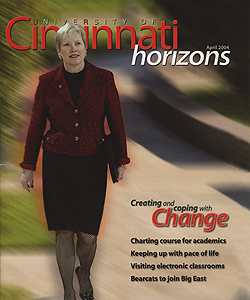By John Bach
By the time you finish this sentence, your mind, your body and the world you live in will have changed.
Consider this: In the five seconds or so it took you to read the opening sentence, the earth moved 93 miles on its path around the sun. As for its passengers, nine people died, and 20 newborns drew their first breath. Five seconds was long enough for your heart to throb about a half dozen times and your lungs to filter roughly a two-liter bottle's worth of air. Even now, as your mind computes new data, it is generating fresh brain cells.
The point? Change is constant.
The University of Cincinnati has undergone some of its biggest changes in recent history -- a new president, a new athletic conference, the start of an academic overhaul and sweeping changes to the physical campus. Yet that only reflects the massive changes with which all of society is grappling these days.
Think of the evolution in product technology alone. Learning to use a computer two decades ago was just the start of it. Now we have to store 27 different passwords and codes to access our computer, the Internet, e-mail, voice mail, multiple e-commerce accounts, the home security system and even the garage door. Today the entire world seems to be in the palm of our hands.
Want to know your place in it? Pull out your global positioning system. Dying to share those first steps with the out-of-town grandparents? Snap and send with your cellular camera phone. Forgot an appointment? Power up your personal digital assistant. Feel like dancing? Scroll through a thousand songs on your pocket-sized MP3 player.
Change is not only constant; it's immense. So how do we deal with it? How do we prepare for it? How do we keep up with it?
"It is like walking a tightrope," says UC's Nancy Evers, professor in the College of Education, Criminal Justice and Human Services. "The trick is no matter the conditions, you need to keep balance and keep going."
Evers has made a distinguished career not only out of studying change but also out of implementing change nationally, particularly in the field of education.
"I've always been fascinated with the whole notion that change is constant," she says. "It is everywhere. It is with us.
"A lot of people view themselves as victims of change when in fact change is a way of life. If we have a choice, we can be reactive to the circumstances around us, or we can be proactive." She chooses the latter.
In Evers' mind, the simplest way to approach change is to think of it as a problem-solving process. In other words, change, be it an individual taking on a new job or an organization moving in a new direction, requires a state of constant learning. "You are going to be taking in information and making life adjustments," she says. "In the proactive mode you can have a vision and create visions together."
What not to do, she says, is to allow change to paralyze you.

 Past Issues
Past Issues